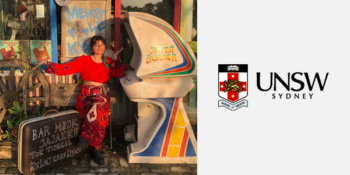Isabella Wang was a participant in the 2020 Creative Arts and Design Professional Practicum from UNSW. Isabella is studying a Bachelor of Media Arts. She received a $3,000 New Colombo Plan Mobility Grant to support her participation in this program.
Q: Why did you decide to undertake ACICIS’ Creative Arts & Design Professional Practicum?
Prior to the discovery of the ACICIS program, my university journey was initially standard. I changed degrees twice and never participated in study exchange, whether that was due to lack of time, confidence and/or money. Nearing the end of my degree, I thought it was too late to experience overseas study. However, when I received an email about the ACICIS CADPP program and learning that the practicum was 6 weeks rather than a semester long experience – this was much more suited considering the responsibilities I have in Australia. Of course, the ultimate goal was to accrue professional experience and having the opportunity to do that overseas is something I was sure to be highly rewarding.
Q: Did you receive a New Colombo Plan Mobility Grant? If so, how did this contribute to your experience in Indonesia?
Yes, I did receive a New Colombo Plan Mobility Grant. To be truthful, I wouldn’t have followed through with the practicum application process if I didn’t receive support as I simply couldn’t afford it.
Q: How will the Creative Arts & Design Professional Practicum benefit or influence your future career?
Naturally, a practicum taken overseas allowed me to meet and connect with others, including interstate students, professionals of different creative backgrounds and Indonesian citizens, and through those interactions, I have been able to expand my perspective and learn simply because I am exposing myself to the beauty of difference. Besides the experiential aspect, this entire practicum has provided me a professional edge – it has been an intensive and fulfilling learning curve as I must adapt to different working structures, learning and exchanging with amazingly diverse people who are saturated in this beautiful culture. Prior to this experience, I didn’t have any knowledge or exposure to this stimulating country that is Indonesia. I have returned with projects I am ready to showcase because I am proud of the outcome and I am grateful for the skills I honed which polished my confidence, but most importantly, I have been fortunate to have connected with a community and able to call them lifelong friends.
Q: Which organisation did you intern with? What were your roles and responsibilities?
The organization I was interning with is called ‘Great Digital Media’. They are a creative agency, providing production services not limited to video, graphic design and social media for multiple clients. I had already expressed a strong desire to work with video production and my mentor happily tailored my responsibilities and if it was insufficient, my mentor was proactive in finding and creating relevant tasks in my field. In my time with ‘Great Digital Media’, I was a videographer and photographer for a cosmetic company on Instagram; I performed similar roles for a Muslim fashion brand and created a promotional video for an established hotel. Above all this, I was supported by an experienced team in realising my personal script which couldn’t have been brought to life without them.
Q: How is the work culture of your host organisation different to work experience you have had in Australia?
Indonesian work culture, from what I gather has a very strong sense of community. I have observed and immersed myself in this concept of ‘nong-krong’, a cultural embossment that views social hangouts as ‘productive nonproductive 4me’. Although different and contrasting with Australia’s rapid and production-centric work culture, I found this experience highly beneficial in my creative process rather than being overwhelmed by unnecessary stress commonly induced by pressure. As ‘nong-krong’ is commonly practiced, it enabled the environment for deeper connection with my peers. This potential site became catalytic and allowed me to comfortably seek help from my peers which is actually a huge factor in how I was able to direct my first short film.
Q: Would you like to return to work in Indonesia again in the future?
My experience here has been absolutely amazing – I find that I have assimilated quite well and adore the people and the country’s vibrant energy. Upon my first month, I most certainly considered the prospects of working in Indonesia in the future.
Q: What do you like to do in your spare time in Indonesia?
Personally, I am an avid enthusiast of social gatherings and find deep and quality relationships one of the most valuable experiences in life. Rightfully so, I do exactly that through ‘nong-krong’; not limited to one location. Otherwise, I enjoy soaking in the details of Indonesia and one can do that easily by relaxing in quirky cafes or travelling on motorbike and watching city landscapes turn rural. Of course, shopping, karaoke and nightlife are always on the table.
Q: Favourite place to eat and favourite Indonesian food?
My experience with Indonesian food is that every restaurant seems to know what they’re doing so I cannot give my favourite place to eat but, with regards to favourite food, I must say Lotek – simple stir fried vegetables in a homemade peanut butter sauce unique to the person behind the wok.
Q: Favourite Indonesian word/phrase?
“Itu gila” – meaning ‘that’s crazy’. An inside phrase I learnt from my peers. Although literally translated, making perfect sense to foreigners, this particular phrase makes no sense in Indonesian. It is, however said as a joke and probably found its way into the Indonesian language because travellers used Google Translate.
Q. What places in Indonesia have you visited during your practicum so far?
Perhaps some may see it as a waste, but I personally felt spending time and deepening my relationship with this community was far more invaluable at the time compared to touring and visiting sites, which is something I can leave for another day.


